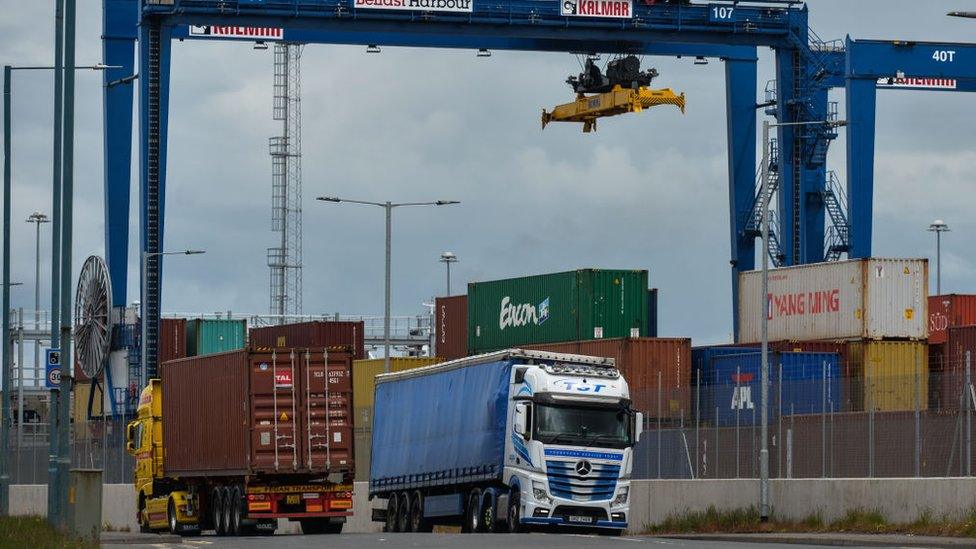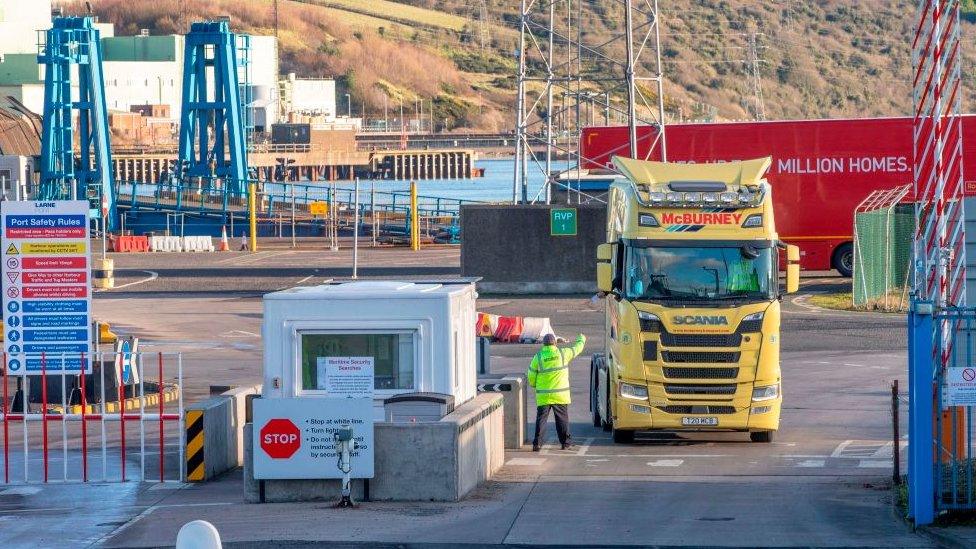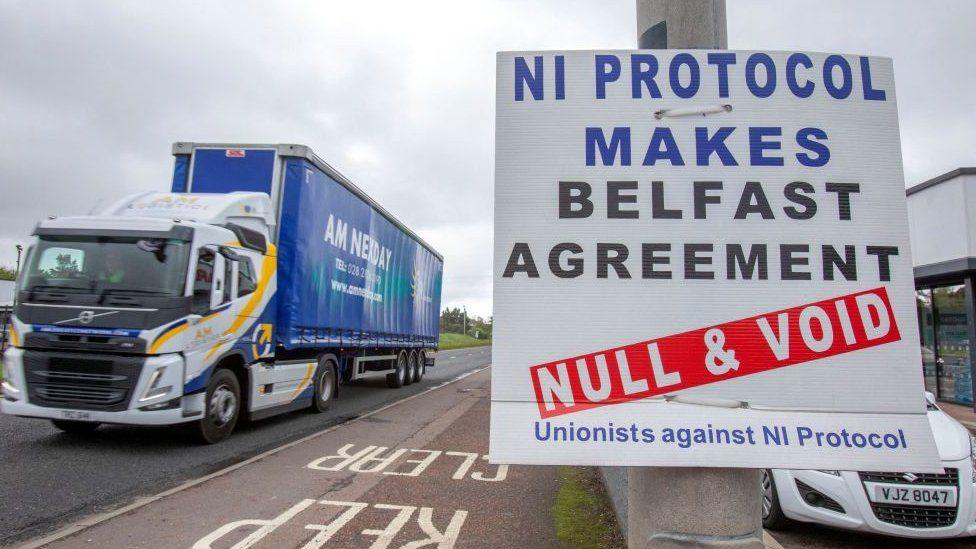Northern Ireland Protocol: New Brexit deal 'inching towards conclusion'
- Published
Leo Varadkar encourages the UK and EU to "go the extra mile" to reach an agreement
A new Brexit deal for Northern Ireland is not yet done but is "inching towards a conclusion", Irish Prime Minister Leo Varadkar has said.
The taoiseach said a protocol agreement could come within days but negotiators still have a gap to close.
He urged politicians from the UK, Brussels and Northern Ireland to "go the extra mile".
Rishi Sunak told the Sunday Times he was hopeful of a “positive outcome”, external, saying: "I want to get the job done."
He said: "As someone who believes in Brexit, voted for Brexit, campaigned for Brexit, I want to demonstrate that Brexit works and it works for every part of the United Kingdom."
The prime minister told the paper: "I'm the prime minister of the entire United Kingdom, Great Britain and Northern Ireland and I take that responsibility seriously. If you look at what it is that's brought peace and stability to Northern Ireland over the past quarter-century, it's the Belfast Good Friday agreement - and that agreement has been unbalanced by the protocol."
The Northern Ireland Protocol was agreed under former Prime Minister Boris Johnson during Brexit talks and came into force in 2021.
It sees Northern Ireland continue to follow some EU laws to get round the need for checks at the UK's border with the Republic of Ireland, and has been an ongoing source of tension.
The UK and the European Union have been negotiating on a way forward and appear to be on the brink of completing a new deal - for which the prime minister has been trying to win support among some critical Tory MPs and Northern Ireland's Democratic Unionist Party.
Mr Varadkar told reporters: "There is the possibility of agreement in the next few days but by no means guaranteed... there's still a gap to be closed."
He said there was ongoing engagement between politicians and he urged them to "to go the extra mile", stressing that the benefits to reaching an agreement are "huge".

There had been plans for King Charles to meet the president of the European Commission in the UK on Saturday, the BBC understands.
The planned meeting between the King and Ursula von der Leyen, originally reported by Sky News, was not part of the negotiations between the UK and the EU and several sources said her visit was cancelled due to operational reasons, unconnected to the political talks.
It is not known when she will now come to the UK, but the fact a meeting was planned is significant as it appears to indicate a Brexit deal was about to be done - and publicly presented - while Ms von der Leyen was in the UK.
Some had suggested a new deal on the Northern Ireland Protocol could be called the Windsor Agreement and include a moment in front of the cameras involving Prime Minister Rishi Sunak and Ms von der Leyen.
The scheduled meeting was criticised by Mr Sunak's critics, with Jacob Rees-Mogg - a senior member of the Tory Eurosceptic European Research Group - saying: "If there were a plan to bring the King in before there is domestic political agreement, it would border on constitutional impropriety."
Both the UK and the EU have to make the choreography of an announcement work at a mutually convenient time and place.
Mr Sunak and Ms von der Leyen spoke by telephone on Friday and Downing Street said the prime minister had made "good progress".
A source said afterwards that it had been "positive" and negotiations would continue, with the leaders agreeing "to discuss this further in coming days."
Foreign Secretary James Cleverly has pulled out of a long-planned trip to the Middle East at the beginning of next week - raising expectations that a formal announcement from the UK and Brussels could be days away.
But there have been repeated delays over the past week or so, as wrangling went on between No 10, the Democratic Unionist Party and Conservative backbenchers.
Mr Cleverly said talks with the EU had been "tough and complicated" but were entered into "with good faith", telling GB News: "We will resolve this when we have addressed all the issues that we are seeking to resolve, rather than [working to] some arbitrary deadline."
The DUP is currently blocking the formation of devolved government in Northern Ireland over its concerns about the deal.
Earlier, a source from the DUP told the BBC they had not been involved in any talks with the prime minister on Friday and had no meetings scheduled over the weekend.

What is the Northern Ireland Protocol?
The Northern Ireland Protocol is a trading arrangement, negotiated during Brexit talks. It allows goods to be transported across the Irish land border without the need for checks.
Before Brexit, it was easy to transport goods across this border because both sides followed the same EU rules. After the UK left, special trading arrangements were needed because Northern Ireland has a land border with the Republic of Ireland, which is part of the EU.
The EU has strict food rules and requires border checks when certain goods - such as milk and eggs - arrive from non-EU countries.
The land border is a sensitive issue because of Northern Ireland's troubled political history. It was feared that cameras or border posts - as part of these checks - could lead to instability.
The UK and the EU agreed that protecting the Northern Ireland peace deal - the Good Friday agreement - was an absolute priority.
So, both sides signed the Northern Ireland Protocol as part of the Brexit withdrawal agreement.
It is now part of international law.

Sammy Wilson MP, the DUP's shadow spokesperson for Brexit, said his party would only accept a deal if EU law "imposed" on Northern Ireland was removed.
He told Sky News: "If the prime minster succeeds in getting that we will embrace it, but if he hasn't succeeded in achieving that aim then as part of the UK we cannot accept it."
Mr Wilson said that "we expect British law should apply in Northern Ireland, not Brussels law imposed on us, with all the disastrous effects that has."
The prime minister has been facing pressure from some Conservative MPs over Northern Ireland's current obligation to follow some EU laws and be accountable to the European Court of Justice.
Eurosceptic Tory MP Sir John Redwood said: "The UK needs to hold out over the EU imposing laws on Northern Ireland. The EU needs to get the Unionists on side."


Related topics
- Published25 February 2023

- Published8 February 2023

- Published24 February 2023